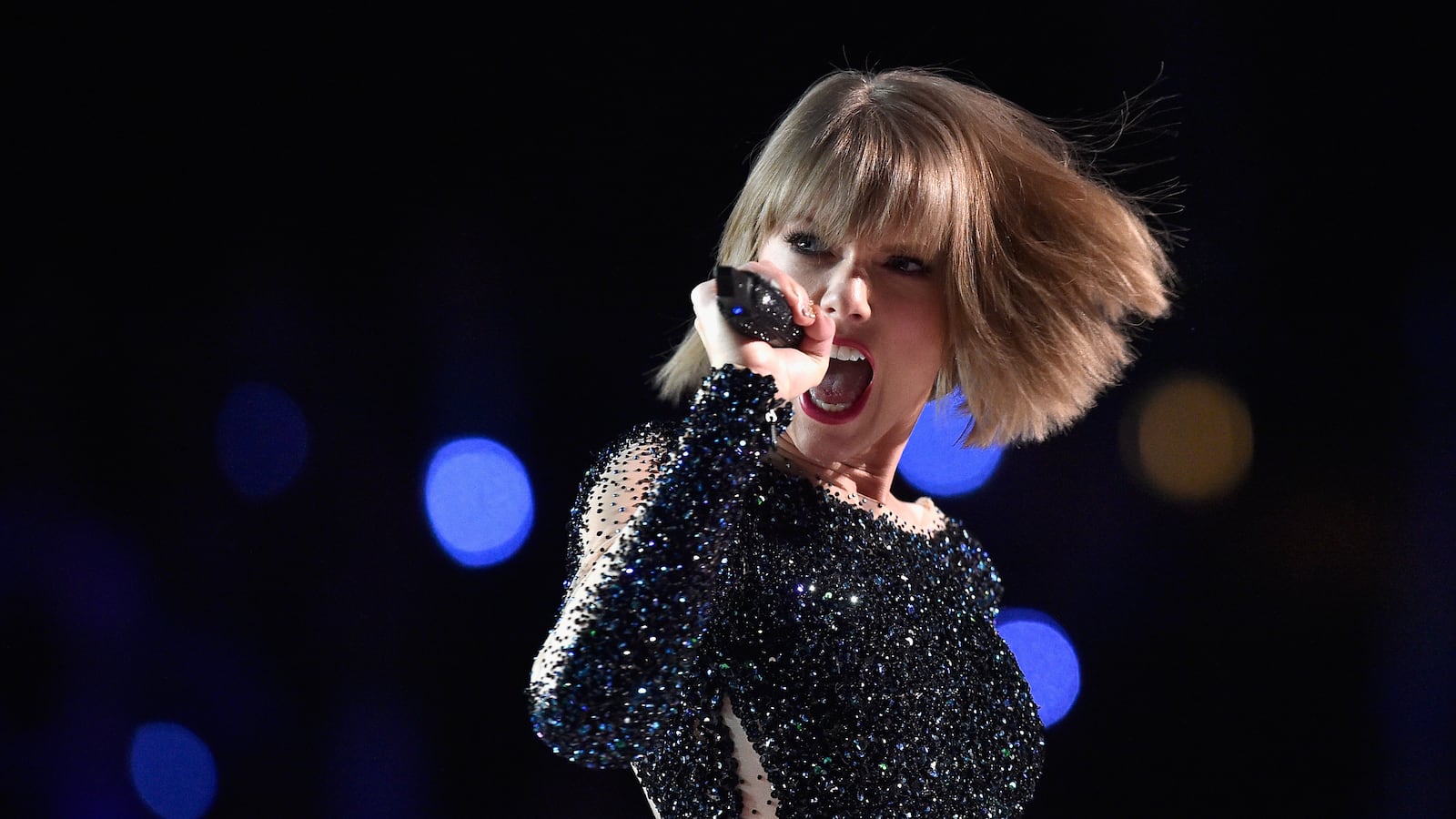There are court cases and rulings that have changed lives—saved lives, even—and moved society forward, defending justice, democracy, and everything our country, at its purest, stands for. With all due respect to those monumental decisions, a judge mediating a copyright case involving Taylor Swift may have laid down one of the most iconic rulings of all time: Your lyrics are too lame to copyright.
Rather, the Honorable Michael W. Fitzgerald, judge and legend, ruled that the lyrics our problematic pop princess was accused of cribbing were too “banal” to warrant any sort of copyright protection. “Too brief, unoriginal, and uncreative,” he wrote, approving his motion to dismiss the case against Swift, before dusting his shoulders off and shouting, “YA BURNT!” as he sashayed away.
The exquisitely-crafted line of culture-altering poetry in question came from Swift’s 2014 single “Shake It Off,” which the singer co-wrote with Max Martin and Shellback. “‘Cause the players gonna play, play, play, play, play / And the haters gonna hate, hate, hate, hate, hate,” Swift sings at the intro of her earworm, which shot straight to number one on both the Billboard charts and list of songs every wedding DJ is obligated to play at receptions.
The argument made by songwriters Sean Hall and Nathan Butler is that the lyrics ripped off their composition, “Playas Gon’ Play,” a turn-of-the-millennium bop if there ever was one, performed by criminally forgotten girl group 3LW as well as me in my car while my mother drove me to theater rehearsal. The beginning of the chorus to that one: “The playas gon’ play / Them haters gonna hate.”
Yes, they’re similar!
That 14 years later those players would still be playing and haters still hating on a radio-friendly pop hit is no coincidence, according to Hall and Butler. Phrases that short typically aren’t copyrightable. But the lyrics are so similar that, according to a BBC write-up of the case, the pair argued that the linking of these two seminal thoughts—players playing and haters hating—in such a recognizable way should be enough for a judge to grant them protection.
“Look what you made me do,” Fitzgerald likely sighed, before penning his dismissal of their argument. And, man, did this judge really go on one.
In his comments, Fitzgerald viciously dismantles the value and artistic credibility of the lyrics, a takedown made with all the affronted passion of your hippy uncle turning on a pop radio station and wailing “It’s not even music!!!” but with the eloquence and erudition of, well, a judge.
“In the early 2000s, popular culture was adequately suffused with the concepts of players and haters to render the phrases ‘playas… gonna play’ or ‘haters… gonna hate,’ standing on their own, no more creative than ‘runners gonna run’; ‘drummers gonna drum’; or ‘swimmers gonna swim,’” he wrote. “The concept of actors acting in accordance with their essential nature is not at all creative; it is banal.”
Oh, but Fitzy was just getting warmed up.
Not only is the concept not creative and banal, he wrote, the lyrics themselves “lack the modicum of originality and creativity required for copyright protection.” Dancing in the hiss of the sizzle, he concluded that they are “too brief, unoriginal, and uncreative to warrant protection under the Copyright Act.”
It’s unclear who should be more offended here: Hall and Butler, whose songwriting skills were so mercilessly roasted, or Swift, who is being accused of, if not copying, at least making reference to a concept and lyrics that were just ruled legally dumb. Fitzgerald is giving Hall and Butler one more shot to prove that the similarities are more egregious than what they’ve alleged thus far before the case settles on February 26.
The duo’s lawyer, Gerard Fox, said he planned to appeal the ruling on grounds that Fitzgerald took it upon himself to adjudicate the originality of the lyrics rather than bringing in an expert to do it for him. “He cannot make himself an expert in the music industry,” he said. “I’m sorry. It’s actually embarrassing.”
We cannot express how much we love every single thing about this story.
This is another in a line of judicial wins for Taylor Swift, following both a legal and brand victory in August when, after delivering a much-celebrated, no-bullshit testimony at a groping trial, a federal jury found that a Denver-based disc jockey had committed assault and battery and awarded the singer the symbolic amount of $1.






